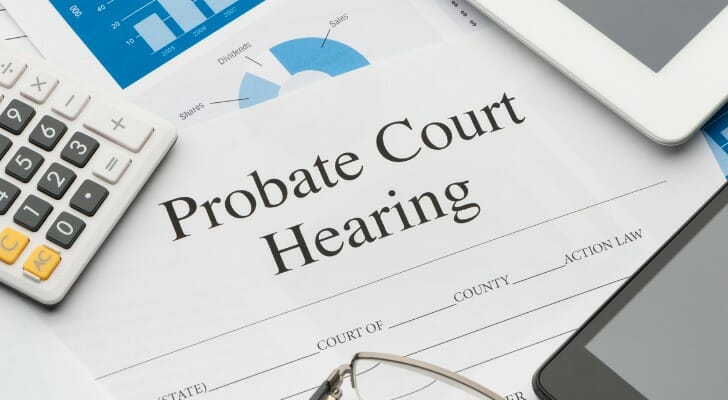Probating an estate is an expensive, time-consuming and sometimes adversarial affair. It is possible, and sometimes advisable, to avoid probate. With the help of an estate planner and an estate attorney, you can learn how to avoid probate for your estate by abiding by estate laws for your state and jurisdiction.
Protect your family’s financial future by working with a financial advisor for your estate planning.
Probate and Why You Should Avoid It
Probate is the court procedure of proving a last will and testament after the decedent dies.
If you have a will and pass away, you will have passed away testate, or with a will. However, when someone dies without a will, this is known as dying intestate, and probate is used to settle the estate
Probate may be long and complicated if the estate is large and there are many beneficiaries. The cost of probate can also be very high if attorneys and an executor are involved. The executor is the administrator of the will as named by the individual in the will.
The executor of your estate will inventory all your assets and liabilities and determine what goes to each beneficiary based on your will. The executor will first make sure all creditors are satisfied, and then distribute your assets to your heirs. After that, the judge rules that the estate is settled. However, it is important to note that during the probate process, someone can contest your will, significantly lengthening the process and increasing costs.
It is advisable to try to avoid probate for several reasons.
Time
Probating an estate is an endeavor that takes time. After the court approves the executor, that party must find all creditors, inventory all assets and perform a host of other administrative tasks.
Probate can certainly take months and, in some cases, years. During that time, the beneficiaries or heirs do not inherit.
Money
Probate can also be an expensive process with several court costs involved.
The executor may need to be paid a fee for the time they spend on probate. Additionally, the executor may recommend hiring a probate lawyer if any problems arise.
All of these actions can be expensive, especially the cost of a probate attorney, which can take a huge chunk out of the estate. Bank accounts and investments are frozen until probate is concluded, which may mean someone else has to pay for funeral costs.
Privacy
If an estate is in probate, the records become part of the public record. The public can see the assets involved, who the beneficiaries were and what they inherited.
This lack of privacy is a serious consideration for those who prefer that their affairs remain private.
How to Avoid Probate

With the right planning, probate may not be necessary.
It is important to consider how much you’re willing to spend to avoid probate, as some options may cost more than your will. While you can do most or all of the work yourself, it’s wise to involve an attorney, if only for advice.
However, there are some things you can do to help avoid probate.
Joint Property Ownership
You can jointly own property. On the deed to property like real estate, simply state how you want that property held.
- Joint tenancy with the right of survivorship. Joint tenancy with the right of survivorship applies when one owner dies, and the other takes ownership without requiring probate.
- Joint tenancy by entirety. Another possibility is joint tenancy by entirety, which is used by married couples and, in some states, domestic partners.
- Tenancy in common. Tenancy in common applies when two or more unrelated people own property together.
- Right of survivorship. Right of survivorship is only available in states that recognize domestic partners who live or own property in Arizona, California, Idaho, Louisiana, Nevada, New Mexico, Washington, Wisconsin or Texas.
Named Beneficiaries
Be sure to name beneficiaries on all possible accounts and property. This includes several types of accounts and assets.
- Life insurance policies
- Bank accounts
- Brokerage accounts
- Pension plans
- 401(k) plans
- 403(b) plans
- IRA accounts
Pay-on-Death Accounts and Registrations
You can convert your retirement accounts and bank accounts to pay-on-death accounts by signing a beneficiary form. You can also convert your security accounts and your vehicle registrations in most states. Many states also allow transfer-on-death real estate deeds.
Transfer-on-Death Designation
Establish a transfer-on-death (TOD) designation for securities and vehicle registrations.
For your securities accounts, you can designate a beneficiary on death. This means that the beneficiary can only take ownership after your death or transfer-on-death. In this case, probate will not be involved; they only have to show identification and a death certificate.
In many states, you can do the same for vehicles.
Write a Revocable Living Trust
If you are consider setting up a trust to avoid probate, you want to consider the pros and cons of a revocable living trust carefully.
First, there is the cost. The average cost of probate is $1,500, but this can vary by state.
A living trust must be maintained over your lifetime, and you will likely need an attorney to maintain it. In this case, your costs will be quite a bit higher than if you go through probate.
On the positive side, revocable living trusts were developed to help avoid probate. Your property is held in trust for you and does not enter into any probate proceeding upon your death. This is because the trustee owns the property, not you individually.
The trust document is like a will. You specify who you want to inherit your property, and it is transferred to them upon your death.
Gifts
Giving gifts to your desired heirs before death is another way to avoid probate – as long as you do not exceed the federal tax guidelines regarding the value of gifts you can give.
Gifts valued over $19,000 each year to the same recipient are subject to tax. If you remain below this amount, it allows for substantial estate tax savings if you are subject to estate tax. As long as your spouse is a U.S. citizen, you can give them whatever amount in gifts you like with no limits and no tax.
Common Mistakes That Can Still Trigger Probate
Many estates go through probate because assets were never properly retitled.
A revocable living trust only avoids probate if property is formally transferred into the trust. Real estate, bank accounts and investment accounts left in an individual’s name remain subject to probate, even if a trust document exists.
Outdated or missing beneficiary designations are another frequent issue. Life insurance policies, retirement accounts and payable-on-death accounts pass according to a beneficiary form, not a will. If beneficiaries are not named or have died, those assets may be forced into probate.
Conflicts between estate documents can also create problems. A will may name heirs who differ from those listed on account registrations or deeds. When instructions do not align, financial institutions may require probate court before releasing assets, delaying distribution.
Owning out-of-state real estate can result in multiple probate proceedings. Real estate held individually outside the owner’s home state may require ancillary probate in each state where property is located, increasing time and administrative costs.
Finally, some estates enter probate because the estate itself is named as a default beneficiary. This often happens when beneficiary forms are left blank or not updated. Once an asset is payable to the estate, it becomes part of the probate process, regardless of other planning steps.
Bottom Line

From a financial perspective, it is wise to avoid probate whenever possible. It will also save grieving beneficiaries and heirs significant time and stress. While many things are the same across state lines, other important issues are different. Therefore, it’s important, while estate planning, to consult with an estate attorney or financial advisor to find out how best to accomplish your goals within your state.
Tips on Estate Planning
- Do you need a financial advisor to help you with the various aspects of estate planning? Finding a financial advisor doesn’t have to be hard. SmartAsset’s free tool matches you with vetted financial advisors who serve your area, and you can have a free introductory call with your advisor matches to decide which one you feel is right for you. If you’re ready to find an advisor who can help you achieve your financial goals, get started now.
- Check out SmartAsset’s Estate Planning Guide for information on estate and inheritance laws in your state plus a wide array of articles on estate planning.
- If you are considering planning for retirement, SmartAsset’s retirement calculator can help you estimate how much you will need to retire comfortably.
Photo credit: ©iStock.com/shapecharge, ©iStock.com/courtneyk, ©iStock.com/monkeybusinessimages
